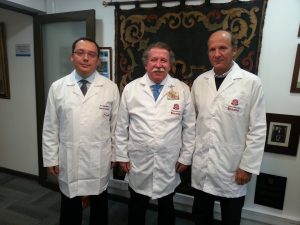Miami, Jan 23 (EFE).- The theory of a group of Irish researchers that the mesentery is one more organ to be counted in the human body has sparked a scientific debate, in which some Colombian surgeons insist they have a lot to say.
Surgeon and professor emeritus Rafael Riveros told EFE that neither the researchers headed by J. Calvin Coffey of Ireland’s University of Limerick Hospital nor the prestigious medical journal The Lancet had a look at medical writing about the mesentery in any other language except English before announcing their thesis.
If they had, they would have found “The Peritoneum: Description of a New Syndrome, Peritoneal Membrane Failure,” edited in 2014 by the University of Rosario, Colombia’s oldest, and signed by Riveros and also by surgeons Carlos Sefair and Andres Isaza.
That book, which combines the results of many years of research into peritoneal membrane failure, something never before described, sheds light on the mesentery, not as an independent organ but as part of the peritoneum.
Riveros told EFE on the phone from Bogota that the organ in question is the peritoneum, not the mesentery, which is only a segment of the peritoneum located on the back part of it and attached to the abdominal cavity.

This idea contradicts Coffey’s theory, which says the mesentery is an independent organ, and in his research makes a list of its functions.
The peritoneum is a slim, solid membrane formed by two layers that can place themselves one on the other: the layer known as the parietal wall covers the entire internal wall of the abdominal cavity, while the visceral wall covers the outer surface of the liver, pancreas, spleen, stomach, small intestine, colon and other organs.
The chief function of the peritoneum is to protect the internal organs against infection and allow them to slip around the abdominal cavity.
The Irish announcement about the mesentery, published in The Lancet last November, got some coverage last week in the general media.
Riveros immediately sent by Internet the book about peritoneal membrane failure to Coffey and The Lancet, together with a series of observations, in order to update them about the discovery made by his team of 18 specialists, himself included.
Coffey answered immediately and promised to have the book translated into English, but Riveros has not yet heard back from The Lancet, though he believes it will publish his observations.
The Colombian surgeon, who was rector of the University of Rosario and director of Mederi Hospital in the Colombian capital, said that Coffey’s research was “valuable,” but noted that he only describes part of the peritoneum, the only part that is attached, he said.
Coffey had said in The Lancet that “in the paper, which has been peer reviewed and assessed, we are now saying we have an organ in the body which hasn’t been acknowledged as such to date.”
To which Riveros replied that the human organ to be added to the list of 78 recognized as such is the peritoneum with all its parts, not the mesentery.
